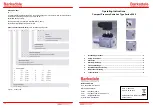
– 594 –
C
HAPTER
22
| Multicast Routing
Configuring PIM for IPv4
◆
The election process for each group is based on the following criteria:
■
Find all RPs with the most specific group range.
■
Select those with the highest priority (lowest priority value).
■
Compute hash value based on the group address, RP address,
priority, and hash mask included in the bootstrap messages.
■
If there is a tie, use the candidate RP with the highest IP address.
◆
This distributed election process provides faster convergence and
minimal disruption when an RP fails. It also serves to provide load
balancing by distributing groups across multiple RPs. Moreover, when
an RP fails, the responsible RPs are re-elected on each router, and the
groups automatically distributed to the remaining RPs.
◆
To improve failover recovery, it is advisable to select at least two core
routers in diverse locations, each to serve as both a candidate BSR and
candidate RP. It is also preferable to set up one of these routers as both
the primary BSR and RP.
P
ARAMETERS
These parameters are displayed in the web interface:
◆
VLAN
– Identifier of configured VLAN interface. (Range: 1-4093)
◆
Interval
– The interval at which this device advertises itself as an RP
candidate. (Range: 60-16383 seconds; Default: 60 seconds)
◆
Priority
– Priority used by the candidate RP in the election process.
The RP candidate with the largest priority is preferred. If the priority
values are the same, the candidate with the larger IP address is elected
to be the RP. Setting the priority to zero means that this router is not
eligible to server as the RP. (Range: 0-255; Default: 0)
◆
Group Address
– An IP multicast group address.
◆
Group Mask
– Subnet mask that is used for the group address.
W
EB
I
NTERFACE
To advertise the switch as an RP candidate:
1.
Click Multicast, Multicast Routing, SM.
2.
Select RP Candidate from the Step list.
3.
Specify a VLAN interface, the interval at which to advertise the router
as an RP candidate, the priority to use in the election process, and the
multicast group address and mask indicating the groups for which this
router is bidding to become the RP.
4.
Click Apply.
Summary of Contents for LGB6026A
Page 6: ...ABOUT THIS GUIDE 4...
Page 40: ...38 CONTENTS...
Page 60: ...58 SECTION I Getting Started...
Page 86: ...84 SECTION II Web Configuration Unicast Routing on page 517 Multicast Routing on page 575...
Page 162: ...160 CHAPTER 5 Interface Configuration VLAN Trunking...
Page 196: ...194 CHAPTER 6 VLAN Configuration Configuring MAC based VLANs...
Page 204: ...CHAPTER 7 Address Table Settings Clearing the Dynamic Address Table 202...
Page 238: ...CHAPTER 11 Class of Service Layer 2 Queue Settings 236...
Page 254: ...252 CHAPTER 12 Quality of Service Attaching a Policy Map to a Port...
Page 448: ...446 CHAPTER 16 Multicast Filtering Multicast VLAN Registration...
Page 470: ...468 CHAPTER 17 IP Configuration Setting the Switch s IP Address IP Version 6...
Page 576: ...574 CHAPTER 21 Unicast Routing Configuring the Open Shortest Path First Protocol Version 2...
Page 606: ...604 CHAPTER 22 Multicast Routing Configuring PIMv6 for IPv6...
Page 620: ...618 CHAPTER 23 Using the Command Line Interface CLI Command Groups...
Page 672: ...670 CHAPTER 25 System Management Commands Time Range...
Page 692: ...690 CHAPTER 26 SNMP Commands...
Page 700: ...698 CHAPTER 27 Remote Monitoring Commands...
Page 854: ...CHAPTER 34 Port Mirroring Commands Local Port Mirroring Commands 852...
Page 862: ...860 CHAPTER 36 Address Table Commands...
Page 958: ...956 CHAPTER 40 Quality of Service Commands...
Page 1034: ...1032 CHAPTER 42 LLDP Commands...
Page 1044: ...1042 CHAPTER 43 Domain Name Service Commands...
Page 1062: ...1060 CHAPTER 44 DHCP Commands DHCP Server...
Page 1206: ...CHAPTER 47 IP Routing Commands Open Shortest Path First OSPFv3 1204...
Page 1250: ...1248 SECTION IV Appendices...
Page 1256: ...1254 APPENDIX A Software Specifications Management Information Bases...
Page 1278: ...1276 COMMAND LIST...
















































